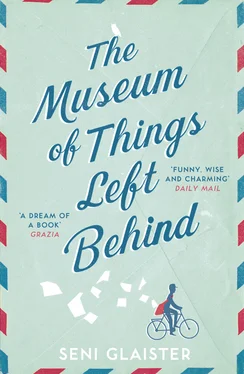The four lower quadrants, each nudging the river’s craggy banks, combine to form the basso s. From here, where the lowest homes dip their toes into the spring floodwaters, the city, carved from a solid seam of red granite, rises chaotically upwards towards the magnificent Piazza Rosa to the north and the slighter, quieter, humbler Piazza Verde in the south. Despite their difference in grandeur, each has claimed the largest, flattest areas on either side of the river to house the country’s municipal buildings. From these piazzas the city continues to clamber upwards, on either side of the river, meandering through the alto s, the higher houses scrabbling and clawing their way ever more precariously; the foundations of many appear to rest on the roofs of the tier beneath them. At the highest point of the gorge the anxiety of the buildings to take a foothold lessens and the dwellings dwindle in density, petering out as the steep gorge softens to join the plateau above. Despite the distance from the river beneath them, even the uppermost homes have chosen to turn their backs on the green expanse of the mesa and instead crane their necks to look down upon layer after layer of houses beneath them, and these houses scrabble for a view of the river below. On a still day the rush of water as it crashes from Hydras, then again from Gorgons and Chimeras, can be heard from every corner of the country: the natural acoustics provided by the land’s topography, the giant loudhailer that forms its mouth at the lowest point, will allow a man snoozing in his chair after lunch high in the alto s to set his watch to the bells chiming in Piazza Rosa way beneath him. That is, if the bells were allowed to chime.
These geographic distinctions – the basso s, the alto s, from the north and west to the south and east – entirely satisfy the needs of all the country’s citizens, even though from time to time the government has attempted to issue new labels to describe the eight regions more accurately. Indeed, on one occasion a bill that introduced a complex postal code system that could pinpoint an address to its very street had been drafted but it had subsequently been mislaid and no replacement scheme had – so far – been adopted. Without the impetus and intervention of Remi it is doubtful that one ever will and so, for the time being, the eight quadrants remain.
And now, high above in the sorting office, with a neat pile of letters to represent each quadrant, it was Remi’s job to shuffle the post into the order of his delivery route. His fastidious nature and eye for detail insisted that he should hand-deliver each letter to the correct address. But he knew, too, that this must be balanced with the knowledge that it was his duty to be efficient with time, the currency by which he was paid and the yardstick by which he was measured; if a letter happened to appear in the pile after its designated drop-off point, he would simply post it through the first available door, trusting that the resident would pass it on to the correct recipient at his earliest convenience. In the summer, when homeowners leave their doors and windows open to encourage safe onward passage of any air current, Remi would take the letters into the homes and stand them against a vase or milk jug so that they would not be missed. The people of Vallerosa were neighbourly by nature and were in and out of each other’s houses all the time. The arrival of a letter to any citizen was always noteworthy, and any intermediary handler who redirected a missive to its correct address would probably be invited to share the news so all were happy to play their part in the safe forwarding of mail.
On a normal day (which this was not), with his mailbag adequately ordered, Remi would carefully attire himself in his uniform. To the Velcro strip above his left breast pocket he would stick the smart insignia of the post office and, to complete his transformation, don the navy blue peaked cap of the postman. Standing in front of the mirror, he would tweak and tug his uniform into its neatest possible configuration, polishing his teeth with his tongue and peering closely at his reflection for unruly nasal hair or other signs of personal weakness. It was undeniable: he was a good-looking, clean-smelling man with decent prospects. That he was still single was as mysterious to Remi as it was to his mother. There was nothing in the reflection that stared back at him that indicated why this should be so. Despite his bachelor status, he was comfortable with the man who eyed him squarely in the mirror. Proud to be an upstanding citizen with purpose, he saluted himself and received the returned salute with a grateful smile. At the threshold he would bend to attach his bicycle clips to his trouser hems and step into his shoes, which, with their rugged crêpe soles, were ideally suited to the long cycle ride ahead of him.
Today, however, as already noted, was turning out to be far from routine. Having emptied out the post and spread it with his toe, as usual, one letter had immediately jumped out at him, his attention seized by its unusual colours. Remi could not have noticed its significance sooner had it been accompanied by a vision of blazing angels and a heavenly choir. Indeed, a well-aimed shaft of light from the window high above was now pointing it out to him. He dropped to his knees and crept forward on all fours. Fishing out his prize, he remained on his knees, barely able to contemplate this trembling fissure in a sea of the prosaic. He scrutinized the envelope with a curious, then greedy eye, scanning every detail. As the full significance of the letter began to sink in, the colour drained from Remi’s face and re-formed as two pink spots high on his cheeks. He held the envelope in both hands, holding it up to the light and then to his nose, inhaling deeply and picking out the exotic scents absorbed on its long journey. Among the dirty whites, greys and browns of the everyday post, the pale blue of the aerogramme was distinct enough to mark it out as unique, but the almost weightless paper and those two neatly affixed stamps, one gold, the other blue, each bearing the foiled outline of the profile of Her Majesty the Queen of England, were enough to make Remi’s hands shake. Never had he held such a precious delivery. The address revealed its intention. With ‘Vallerosa’ neatly printed as its closing directive and a double wavy line beneath it, drawing it to the attention of the postmen of many nationalities who had ensured its safe onward passage, the address insisted, politely but firmly, that it be directed without delay to the country’s Parliament Hall, the home of the government.
Breathless, he bundled the mail into his satchel, barely cognizant of the order as he stuffed it in. He dressed hurriedly, buttoning his shirt with one hand while smoothing his hair with the other. He slapped the Velcro badge to his chest, at an inappropriately jaunty angle. He jammed his feet into his shoes, and only slowed to stow the precious letter between his string vest and chest, then tucked his shirt tightly into his trousers.
Off he went into the fresh morning air, heart soaring and palms tingling with excitement and anticipation. Remi pedalled furiously for the last twenty yards of the steep hill, which allowed him to freewheel, at pace, along a dark alley, then diagonally across Piazza Rosa. He bumped over the cobbles, his bell ringing clearly in the quiet of the morning square, and leaped off, the bicycle continuing without him until it came to a clattering halt against the railings of Parliament Hall.
‘I have a letter! A letter for our president! I must deliver it at once! Look, it has, it has … a foreign stamp!’ The two guards knew Remi well, drank with him frequently and would probably be joining him for their regular light lunch of cold boar and bread later that day, but nevertheless each reached for his gun holster as the postman ripped at his shirt, buttons flying. They took turns to scrutinize the letter, looking closely at the address, the stamps and back again at the trembling postman. Undeniably, the seal of international airfreight was a persuasive argument and one that, upon lengthy reflection, neither felt able to resist. On the understanding that both men would accompany him until responsibility had been passed to a senior minister, Remi was allowed to enter Parliament Hall. As they pushed the double doors to enter, all three experienced a prickle of excitement as the building swallowed them.
Читать дальше












